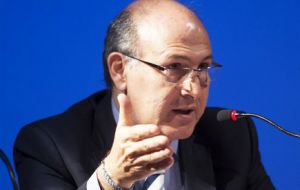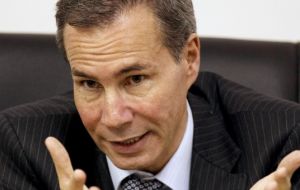MercoPress. South Atlantic News Agency
Nisman's criminal case against President Cristina Fernandez was buried on Tuesday
 The panel unanimously agreed to accept prosecutor Javier de Luca’s decision to drop Nisman's case saying there was no crime on which to base an investigation.
The panel unanimously agreed to accept prosecutor Javier de Luca’s decision to drop Nisman's case saying there was no crime on which to base an investigation.  Nisman accused Cristina Fernandez and minister Timerman of trying to derail a lengthy investigation into the bombing of the AMIA Jewish center
Nisman accused Cristina Fernandez and minister Timerman of trying to derail a lengthy investigation into the bombing of the AMIA Jewish center The criminal case against President Cristina Fernandez was closed Tuesday when federal judges from Cassation Court accepted a prosecutor’s decision not to pursue accusations that she had conspired to shield Iranians suspected of planning the 1994 bombing of a Jewish community center in Buenos Aires.
The case had originally been brought by another prosecutor, Alberto Nisman, who was found dead in January at his home, hours before he was to present his findings before Congress. Nisman’s body was lying in a pool of blood, and he had a bullet lodged in his head. A pistol was found on the floor under the body, and a spent cartridge was also at the scene. There was no suicide note.
His death thrust Argentina into a severe political crisis and a team of experts is trying to determine whether it was suicide or murder, but the evidence is inconclusive and a consensus seems improbable.
The three-judge panel unanimously agreed to accept a prosecutor’s decision to drop Nisman's case. The prosecutor, Javier de Luca, refused to take up an appeal to carry the case forward after two courts dismissed it, saying there was no crime on which to base an investigation.
“Not one crime can be found,” the panel's ruling said of Nisman's presentation, and determined that “holding that the signing of a treaty constitutes a criminal plan is an absurdity from a legal point of view.”
In 2013 Argentina and Iran signed an Memorandum of Understanding by which the alleged Iranian officials that masterminded the terrorist attack, would be questioned by Argentine prosecutors to put an end to the case. However the MoU was only approved by the Argentine congress after much debate, and later thrown out as unconstitutional. The Iranian parliament did not even consider it.
“There is no search possible for hidden operations or the execution of hidden motives, because it is all out there in plain sight,” the ruling added, while pointing out that in Argentina's criminal code “the crime of conspiracy does not exist.”
Nisman accused Cristina Fernandez and Foreign Minister Hector Timerman of trying to derail his lengthy investigation into the bombing of the Jewish center, which killed 85 people and injured 300. He said they had plotted a political cover-up to deflect his charges that former Iranian officials masterminded the attack.
The progress of Nisman’s case through the courts highlighted how acutely politicized Argentina’s judiciary had become. Many Argentines question whether judges and prosecutors can act impartially, free of political interests.
Judges who threw the case out said Nisman had groped for evidence to support a predetermined hypothesis. The government also accused him of trying to destabilize president Cristina Fernandez, who has recently sought to link him to her other foes. Two prosecutors, however, argued that he had gathered leads strong enough to pursue.
Still, one of the judges, Ana María Figueroa, underscored in Tuesday’s ruling comments by Mr. de Luca that “no glimmer at all remains” of Nisman’s claims of a cover-up.
Nisman's accusation was first dismissed by judge Daniel Rafecas, a ruling backed up in the Appeals Court and now Cassations.




Top Comments
Disclaimer & comment rules-

-

-

Read all commentsThey've gotta get this stuff buried and out of the way before the October elections - but will it stay buried, really?
May 13th, 2015 - 10:59 am 0If Nisman was so far from the truth, why did he have to die?
May 13th, 2015 - 11:30 am 0Something is very, very wrong here.
The truth was buried with Nisman.
May 13th, 2015 - 02:40 pm 0“HAVE YOU PETTED YOUR TROLL TODAY?”
Commenting for this story is now closed.
If you have a Facebook account, become a fan and comment on our Facebook Page!